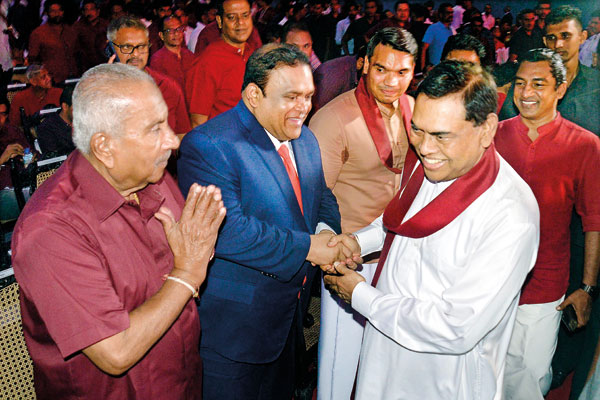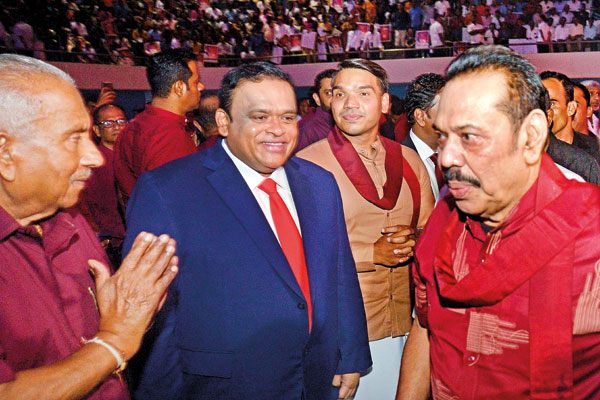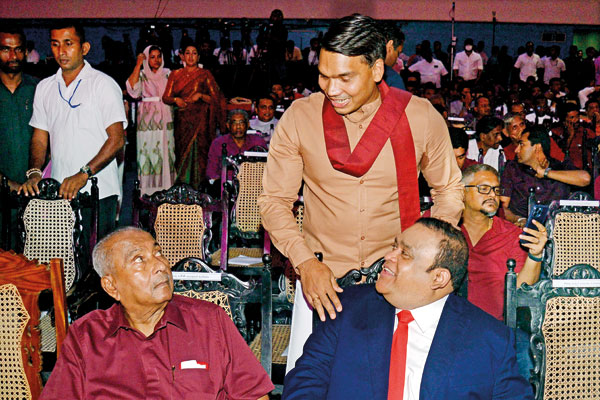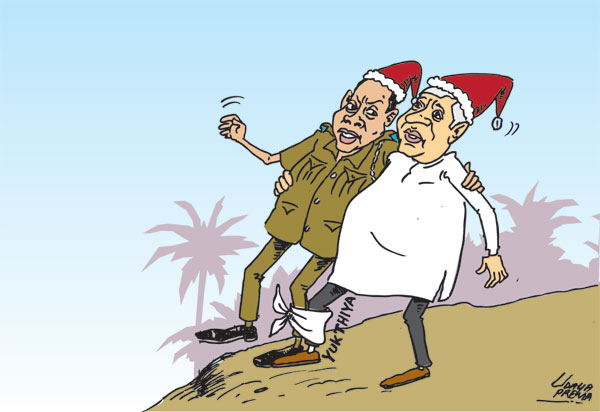Columns
- SLPP flies Dhammika Perera kite
- Mahinda blames Yahapalana government for economic woes
- GL wooing Dulles Group to join SJB
- Harsha says no entry for the corrupt in SJB
By Our Political Editor
Most importantly, it delivered a clear message that Ranil Wickremesinghe will not be the SLPP’s official candidate in next year’s presidential elections. Why a man whom they chose in desperation on July 20, last year, to head a nation, pull it away from bankruptcy and restore law and order should be left out furtively from being the SLPP candidate is a critical question. Whoever said there are no permanent friends or enemies in politics is correct.
It was done with no words written or spoken, but the message came out very eloquently for the most likely candidate. He is Dhammika Perera, a millionaire businessman and casino owner. Officially, he has been described as one of the four in the race. Why him, asked a peeved professional from a prominent party. “If you have someone with more wealth to spend for the party, bring them along. We can replace him,” he replied tartly. At the convention, Perera was in the front row, only to be separated by Gamini Lokuge from Basil Rajapaksa, the SLPP founder and ideologue.
Another important takeaway is the decision at the convention to leave vacant the post of national organiser, one held by Basil Rajapaksa. It falls in line with the plans the SLPP is making for the presidential election. When its presidential candidate is formally announced, it is he or she who will be the national organiser. The rationale is that the party will not support anyone from outside to be the presidential candidate. This is a lesson learnt from nominating Gotabaya Rajapaksa as a presidential candidate in 2019. Though formally an SLPP member, he played no other role. He held no position as an office-bearer.
Wickremesinghe wants to hold the presidential election first, as stipulated in the Constitution. It is slated for September next year. The parliamentary general elections will come thereafter. A move for a switch has been categorically ruled out by him. This is because the conduct of a general election first would deprive the pension rights of 83 parliamentarians who have been elected anew. The threshold to qualify for their pension is in the months before and after September next year.
Just a day ahead of the special convention at the Sugathadasa Indoor Stadium, newspapers ran full-page accounts with Perera’s photograph. They spoke of 100 DP (Dhammika Perera) Education IT Campuses across Sri Lanka, enrich 200,000 students with IT and digital skills. A click on a QR code led to the nearest IT campus. That, no doubt, was considered an effective curtain-raiser to launch a new, most likely candidate at the convention. On the other hand, Perera’s philanthropy has benefited the SLPP immensely. He has been underwriting some of the SLPP’s key events.



Businessman Dhammika Perera, one of the SLPP's presidential aspirants, was seated along with the party's stalwarts in the front row at the recent SLPP convention at the Sugathadasa Indoor Stadium
Another takeaway is the fact that this is the first time since 2005 that no member of the Rajapaksa family is contesting the presidential election. More than the introduction of a new candidate, important enough, are the difficult conditions and environment under which the SLPP is emerging. Just a year ago, 76 houses of SLPP parliamentarians were burnt down, and one of them was killed brutally. Others were mortally frightened to venture out of their homes. It is President Wickremesinghe’s steadfastness that brought about a bearable law-and-order situation. Whether they can produce a winner or loser remains in the hands of the voters. However, it must be emphasised that the SLPP wields significant influence over the outcome of elections.
Other than the convention, there is also a paradoxical situation. Here again, without pointed references, the SLPP has been insisting on the correctness of its economic policies when it governed. No doubt, a critical question that begs an answer in such a situation is how the economy deteriorated and the country went into bankruptcy under then-President Gotabaya Rajapaksa. The law-and-order situation reached such catastrophic levels. In fear and desperation, President Rajapaksa fled the country in an Air Force aircraft.
The Supreme Court on November 14, by a majority judgment, ruled that three members of the Rajapaksa family, including two former presidents and five former officials who held key positions, “by the actions, omissions, decisions and conduct” had “demonstrably contributed to the economic crisis. Those referred to were Mahinda Rajapaksa, Gotabaya Rajapaksa, and Basil Rajapaksa. With no reference to the SC ruling, Rajapaksa defended their economic management. He made it clear in a statement on November 28 that “the fact that I left behind a very robust economy in January 2015 is well documented. After I was voted out, the economic growth rate dropped to 4.2% in 2015 and ended up in the negative range at 0.2% below zero by 2019. Sri Lanka’s total outstanding external debt had increased by nearly 28% from USD 42,914 million at the end of 2014 to USD 54,811 million by the end of 2019. The debt-to-GDP ratio, which had been brought down to 69% by the end of 2014, had increased to nearly 82% by the end of 2019.
“The All-Share Price Index declined from 7,299 at the end of 2014 to 5,990 by the end of October 2019. Yet during the entire five-year period from 2015 to 2019, the average price of crude oil was USD 60 per barrel – the lowest in recent history. There were no external reasons for Sri Lanka’s economic decline between 2015 and 2019. India and Bangladesh experienced average growth rates of more than 7% and the Maldives over 6% during this period. Even developed countries like the USA and Germany experienced robust economic performance during those years. However, Sri Lanka’s average growth rate between 2015 and 2019 was just 3.5%, equal to the growth rate recorded in 2021 at the height of the pandemic. The accumulation of foreign commercial debt between 2015 and 2019, particularly in the form of International Sovereign Bonds (ISBs) was by far the worst disaster to befall us during that period. When I was defeated in January 2015, outstanding ISBs amounted to USD 5,000 million which was amply covered by our foreign reserves of USD 8,208 million.
“However, between 2015 and 2019, outstanding ISBs increased threefold to USD 15,050 million with borrowings of USD 2,150 million in 2015, USD 1,500 million in 2016, USD 1,500 million in 2017, USD 2,500 million in 2018 and USD 4,400 million in 2019. Of this, USD 2,000 million was used to roll over ISB’s taken during my tenure; thus, the total amount in new ISB’s issued between 2015 and 2019 was USD 10,050 million. Despite the build-up of the stock of outstanding ISBs to USD 15,050, Sri Lanka’s total foreign reserves were just USD 7,642 million at the end of 2019. Thus, when I became Prime Minister again in November 2019, our government inherited an economy that was already on its last legs.
“It was in this weak and vulnerable situation that the COVID-19 pandemic hit Sri Lanka in early 2020, the consequences of which need further discussion. In any discussion of the economy, it is vital to note that the per capita GDP is the most fundamental economic indicator used to judge the economic situation of a country, and the contribution of my 2006–2014 government to increasing Sri Lanka’s per capita GDP is more than double that of all other post-independence governments put together. The people of this country should base their decisions on proper data and facts and not on noise, lies and propaganda. Sri Lanka cannot afford another political mistake like that of January 2015….” Though the statement was followed soon after its issue by a disclaimer, it did not, however, become effective. It was published by most media outlets. Notably the disclaimer was not sent to some outlets and it was confirmed that its withdrawal was not being sought.
The silence over the role of President Gotabaya Nandasena Rajapaksa, who won overwhelmingly with 6.8 million votes, is defeaning. Why then did he abandon his own office and take to the safety of the President’s House (Janadipathi Mandiraya). Why then did he have to abandon his own people, flee the country, and hide in Singapore and later in Thailand? Unable to find a safe haven, he returned to Sri Lanka. Noteworthy enough, he has not lost all the perks of a President. He continues to have a security contingent of over 100, the same enjoyed by a serving president.
SLPP leader Mahinda Rajapaksa voted in Parliament last week for the budget which envisaged an increase in the Value-Added Tax (VAT). In a two-page statement issued on December 20, however, he declared that the high tax burden had precipitated an exodus of educated and highly trained professionals from the country, giving rise to a new crisis. He noted that following increases in the VAT through the budget for 2024, tax policy was set to become a major political issue in 2024. Rajapaksa deals with the economic mismanagement during the yahapalana government.
He notes: The call to reduce taxes is based on solid economic principles. When taxes are low, both individuals and corporations have more money to spend and invest, and this acts as a driver of the economy. Low taxes were a cornerstone of my government’s policy, and they made a major contribution to the unbroken nine-year economic boom that this country experienced between 2006 and 2014. So as not to burden the people with taxes, my government of 2006-2014 restricted the overall year-on-year increase in government tax revenue to around Rs. 100 billion a year. Through careful economic management, my government reduced the debt-to-GDP ratio from 90% at the end of 2005 to 69% at the end of 2014, thus ensuring the feasibility of the low tax regime.
“However, over the past several years, there have been well-funded propaganda campaigns promoting a headlong and mindless opposition to everything even remotely associated with the name ‘Rajapaksa’ including the low tax policy. In order to blacken the very concept of low taxes, some even claimed that the Rajapaksa-led governments reduced taxes to help cronies. That is an outright lie. Tax exemptions can be granted only under laws like the Board of Investment Act and the Strategic Development Projects Act in order to attract investors for specified projects. After 2015, the low tax regime was rejected in favour of a high tax regime.
“Sri Lanka’s growth rate declined precipitously after 2015, ending up at 0.2 below zero by 2019. Due to bad economic management, the period from 2015 to 2019 saw an increase in taxes while at the same time experiencing a precipitous increase in foreign debt. When I was voted out in January 2015, the outstanding.
International Sovereign Bond debt was only USD 5,000 million. The Gotabaya Rajapaksa government of 2020-2022 paid off USD 2,500 in outstanding ISBs which means that only USD 2,500 million in ISBs now remains from my era.”
He then adds: “They then proposed a raft of conditions that would qualify us for IMF assistance, but those conditions would have made it impossible for us to face the COVID-19 threat in the manner we did in 2020 and 2021. The present government is now implementing stringent conditions as part of an IMF programme. Thus, one thing led to another, finally resulting in a situation where we now see top professionals holding multiple university degrees and professional qualifications agitating on the streets, demanding a reduction in taxes.
“The SLPP which I lead is part of the government. However, the present Head of the Government and Head of State is the leader of a different political party with different policies. In a situation where this country was faced with complete anarchy, Parliament elected a President to serve the remainder of former President Gotabaya Rajapaksa’s term. The new president successfully restored law and order to the country. He is now directing government policy as the Executive President. At this moment, the primary duty of the SLPP is to ensure a stable government until the next national elections.
“In the future, every member of the public should pay special attention to the tax policy and the past economic practices of the political party they vote for. As elections draw closer, once again we see attempts to hustle people blindly and unthinkingly in various directions through ramped-up propaganda and social media hysteria. Whatever decision the people make at the next elections should be based on rational thinking, proper facts, and correct data. We are still living through the consequences of January 2015 and this country cannot afford another mistake like that again.”
A closer study of the two statements reveals that Rajapaksa is making clear what we face today on the economic front has its origins in January 2015. So, the blame is on the yahapalana government. Since “it is the primary duty of the SLPP to ensure a stable government until the next national elections,” Rajapaksa is sounding cautious not to rock the boat. He is nevertheless warning that “tax policy is set to become a major political issue in 2024. That amounts to putting President Wickremesinghe on notice that their position could become more pronounced when it comes to election time. He said, the President “is the present Head of the Government and Head of State and is the leader of a different political party with different policies.”
Thus, if the SLPP’s ‘second special convention’ spelt out where the party is headed when it nears election time, it raises some key questions. Important among them is whether all SLPP parliamentarians will heed the party line and go along with them or will a section back Wickremesinghe? Such support from some of them emerged after the International Monetary Fund (IMF) committed a debt restructuring deal of US dollars 2.9 billion, drawing praise for Wickremesinghe. Whether such pledges remain alive must be seen. One thing that has become clear is the fact that Wickremesinghe did not make efforts to build the grassroots-level base of the United National Party (UNP). His approach, highlighted at the party’s convention in September, was a technology-based organisational drive.
Wickremesinghe expects the support of a Grand Alliance of different political parties and groups for his candidature in the presidential elections. It is not immediately clear which political party or parties will back his candidature. Both the Samagi Jana Balavegaya (SJB) and the National People’s Power (NPP) led by the Janatha Vimukthi Peramuna (JVP) are averse to forming alliances. The SJB has also ruled out any tie-up with the UNP.
Besides Wickremesinghe, there are the following known contenders so far in a presidential election. Sajith Premadasa (SJB), Dhammika Perera (SLPP), Anura Kumara Dissanayake (NPP), Dilith Jayaweera and Janaka Ratnayake.
Smaller parties that splintered from the SLPP are confronted with their future activities in the wake of the presidential election. As reported in these columns last week, the Freedom People’s Congress (FPC) is on the verge of a breakup. A section wants to leave and join the Samagi Jana Balavegaya (SJB) led by Opposition Leader Sajith Premadasa. They are not happy about the long-drawn dialogue the Congress has been holding with the SJB leadership. As revealed in these columns last week, Congress leaders are seeking a change in SJB’s economic policies, an electoral arrangement, and a possible accommodation of their representative in the leadership structure. Issues came to the fore at a stormy meeting of the FSC Political Bureau on Friday. It was chaired by the leader of the faction, Dulles Allahapperuma.
All 13 parliamentarians who walked away from the SLPP are members of this Bureau. The meeting began with an appeal by G.L. Peiris, a former Cabinet minister in successive governments, wanting to suspend all items for discussion and take up the subject of talks so far to join the SJB. He wanted their leader, Allahapperuma to first make a statement on the talks held earlier. After he said there was no progress, Peiris made a strong plea that they join without any preconditions. The meeting chaired by Allahapperuma ended, and Peiris continued it with some members at his Narahenpita residence. Those present included Nalaka Godahewa, Channa Jayasumana, and Dilan Perera.
The initial response of SJB leader Premadasa was to ask the members to join individually. In a bid to thwart this, the dissident group has been canvassing other members to form an alliance with limited demands and join the SJB. One source said they met SJB leader Premadasa last Wednesday at a leading social club in a Colombo hotel to discuss the preliminaries of joining. However, the source said they are yet to gain the support of most other members. They are trying hard to see whether they could sign a deal on January 12 next year, the birthday of Sajith Premadasa, the source added.
Nevertheless, there is considerable opposition within the SJB too. Last week, SJB frontliner Harsha de Silva declared that the SJB would not take into its fold those tainted with accusations of racism or corruption. The reference was to two members who were in the rebel group with Dr. Peiris. A one-time Muslim parliamentarian has also voiced his protests over one of them for being a campaigner for the burial of Muslim bodies in a designated graveyard in the eastern province.
As things stand, President Wickremesinghe’s candidature in the presidential election poses strong challenges. He must first succeed in forming a grand alliance and thereafter face the presidential election. It is noteworthy to mention that he has won praise for the handling of measures to recover a battered economy and embarking on an economic course which raised hope. It will also be a daunting task for political parties that have splintered from the SLPP as well as other smaller parties. The post-Christmas and New Year holidays will see them busy making plans for the presidential polls.
Buying or selling electronics has never been easier with the help of Hitad.lk! We, at Hitad.lk, hear your needs and endeavour to provide you with the perfect listings of electronics; because we have listings for nearly anything! Search for your favourite electronic items for sale on Hitad.lk today!


Presidential poll: Wickremesinghe faces challenging task
View(s):